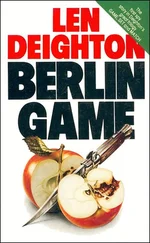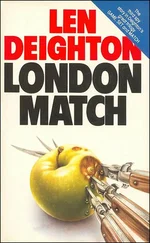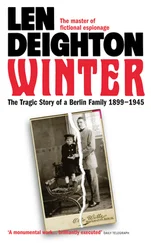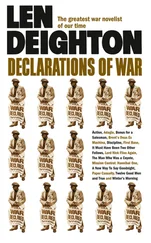Len Deighton - XPD
Здесь есть возможность читать онлайн «Len Deighton - XPD» — ознакомительный отрывок электронной книги совершенно бесплатно, а после прочтения отрывка купить полную версию. В некоторых случаях можно слушать аудио, скачать через торрент в формате fb2 и присутствует краткое содержание. Жанр: Триллер, на английском языке. Описание произведения, (предисловие) а так же отзывы посетителей доступны на портале библиотеки ЛибКат.
- Название:XPD
- Автор:
- Жанр:
- Год:неизвестен
- ISBN:нет данных
- Рейтинг книги:4 / 5. Голосов: 1
-
Избранное:Добавить в избранное
- Отзывы:
-
Ваша оценка:
- 80
- 1
- 2
- 3
- 4
- 5
XPD: краткое содержание, описание и аннотация
Предлагаем к чтению аннотацию, описание, краткое содержание или предисловие (зависит от того, что написал сам автор книги «XPD»). Если вы не нашли необходимую информацию о книге — напишите в комментариях, мы постараемся отыскать её.
XPD — читать онлайн ознакомительный отрывок
Ниже представлен текст книги, разбитый по страницам. Система сохранения места последней прочитанной страницы, позволяет с удобством читать онлайн бесплатно книгу «XPD», без необходимости каждый раз заново искать на чём Вы остановились. Поставьте закладку, и сможете в любой момент перейти на страницу, на которой закончили чтение.
Интервал:
Закладка:
‘I had nothing to lose, that’s why,’ said Pitman, as if an explanation was being forced from him. ‘Could I have gone to lunch at the University Club and returned those stares I would have got after my friends read about Kasserine?’
‘I feel no guilt,’ said Stein stoically. ‘We faced the best the Krauts could throw at us, and we ran. But we slowed them up a little, Colonel, don’t ever forget that.’
‘Don’t fool yourself, Charles. They brushed us aside like bed bugs in a whore house.’ Pitman reached up to adjust the driving mirror.
For a while the two men sat in silence, Pitman driving with exaggerated care, while Stein stared out at the suburbs of Geneva with unseeing eyes. On that warm Saturday evening in August everyone who could afford it was spending the weekend in the countryside or along the lake. These suburban streets were silent and empty.
‘You heard Major Carson order me to turn back,’ said Pitman suddenly. ‘You heard him, didn’t you?’
‘You were absolved, Colonel. I gave evidence to the little curly-haired captain from the judge advocate’s staff who flew down from Algiers. Delaney told him the same. You remember.’
‘Goddamn it, Corporal,’ said Pitman in an uncharacteristic display of bad temper. ‘I’m not asking you whether you got me off the hook. Answer my question: did you hear Major Carson or didn’t you? I need to know.’ He was shouting by now.
Stein looked out of the window. It was all a long time ago. What the hell difference did it make? In Stein’s world, trouble arrived, was dealt with and then forgotten as soon as possible. Why travel back into the past to rake over old worries, when there were so many right here and now, just screaming for attention? Stein looked at his colonel-his bald head made ridiculous by the curly hair around his ears-and then looked back at the wide, graceless streets of the city. No one had heard Carson talking with Pitman. The two officers had deliberately walked far enough away in order to avoid being overheard. Pitman knew that. Stein said, ‘Sure I heard him, Colonel. You didn’t want to pull back but he insisted.’
‘That’s right,’ said Pitman triumphantly. ‘That’s exactly what happened. I was obeying orders.’
Stein nodded. He had other more pressing things on his mind than the colonel’s battle with his conscience. ‘Maybe we both should scram,’ said Stein. ‘We’ll both go to Mexico or Canada. You wait there while I go to New Jersey using my Brazilian passport. I’ll take passport photos of you with me, see Petrucci and bring passport and papers for you.’
‘Shall I keep on the airport road?’ said Pitman. He bit his lip. Why did he always ask Stein what to do?
Stein took his time in replying. Every damned road out of Geneva, except the north lakeside road and the autoroute alongside it, led into France. Stein wondered whether the French CRS men who policed the border crossings would have received orders to detain them. Did the French work that closely with the British? And what would they charge them with? Perhaps the French would simply confiscate the Hitler Minutes as contraband and then deport them; he had heard of such things happening to people time and time again. The Compagnies Républicaines de Sécurité were a law unto themselves. ‘The autoroute ,’ said Stein.
‘I think we are being followed,’ said Colonel Pitman eyeing the mirror. ‘The same car has been behind us ever since we left Rollins. It’s a white Mini.’
‘Put your foot down. It’s fast, this Jaguar, isn’t it?’
‘I doubt we could pull far away from him,’ said Pitman. ‘I’m not any kind of ace driver. I suppose he must have seen us.’ He flicked the right indicator and watched anxiously until the indicator of the car behind them was also flashing. ‘He’s following us,’ said Pitman. ‘There’s no doubt now.’ He felt another twinge of pain and rubbed his chest. If only he could belch as readily as Stein could.
‘Stop on the autoroute ,’ said Stein. ‘I’ll take care of him. Then we’ll come back to the airport afterwards.’
‘We’ll see if we can pull away a little,’ said Pitman. He slowed for the Lausanne autoroute turn-off and swung the wheel over. There was a soft squeal of brakes and the car behind followed closely. Once on the big highway, Pitman put his foot down; all thoughts of indigestion pains vanished. His Jaguar was a new and powerful model with only 3000 miles on the clock. Kept in perfect mechanical order, the car responded to the open throttle and leapt forward like a racehorse. The car following them was equally new but it had been ill used by nearly one hundred drivers with little in common except a careless indifference about things borrowed. The Mini spluttered and objected as the driver brought the speedometer needle past sixty. Only with difficulty could he keep behind the Jaguar.
The cars were touching eighty miles an hour when Colonel John Elroy Pitman the Third suffered his third, and terminal, heart attack.
41
Willi Kleiber hated to be alone. After his friend Max Breslow had gone back to his hotel, Kleiber went upstairs to the little room which he used as an office and called the phone number that his new client had left with him.
In spite of Willi Kleiber’s off-hand remarks to Breslow, he was in fact extremely pleased at the prospect of working for Helmut Krebs, who was one of the richest men in West Germany. He owned the greater part of a chain of supermarkets that were to be found all over Europe. In the last few years, he had begun manufacturing and packaging many of the goods sold there. His own brands of instant coffee, yoghurt and soft drinks were as good as any of the better-known labels and always just a few Pfennigs cheaper.
It was the Krebs family background that attracted Kleiber to the idea of having him as a client. Krebs’s brother was an ambassador, and his wife and sister were both well-known patrons of the theatre. Some member of the Krebs family was usually represented at any chic international social gathering. Such a client-who mingled in a world where widespread concern about kidnapping, murder and blackmail was on everyone’s mind-could open unlimited business opportunities to a company which traded on its capacity to reassure potential victims.
Kleiber was not surprised therefore to find that Krebs’s confidential secretary was guarded in his response to Kleiber’s suggestion that he should see Mr Krebs at once, rather than wait until the appointment they had made for the next morning.
‘Mr Krebs has a dinner engagement,’ said the secretary.
‘So do I,’ said Kleiber. ‘I must leave by eight o’clock.’
‘Mr Krebs is having dinner in Venice,’ said the secretary coldly. ‘ Venice, Italy,’ he added in case there should be any doubt. ‘He will be using his private jet.’ Nothing could have been better calculated to sharpen Kleiber’s interest.
He told Kleiber to hold the line and it was several minutes before he returned to say, ‘Very well. Mr Krebs will see you this evening. Be at Geneva airport at six o’clock sharp. You can speak with Mr Krebs on the aircraft, which will bring you back to Geneva again at 7.30. I’ll arrange a car to take you to your appointment if you wish.’
‘No need,’ said Kleiber. ‘I’ll use my own car.’
‘I’ll ask the pilot to send someone to collect you. Wait by the bar on the departures level and one of the staff will take you through the formalities. Be sure you bring your passport. You’ll have to clear customs and immigration of course.’
‘I understand,’ said Kleiber, although the self-importance of the man at the other end was intolerable to him. It was always secretaries and clerks and doormen who were so rude, thought Kleiber; it was likely that Mr Krebs himself would prove to be gracious and charming.
Читать дальшеИнтервал:
Закладка:
Похожие книги на «XPD»
Представляем Вашему вниманию похожие книги на «XPD» списком для выбора. Мы отобрали схожую по названию и смыслу литературу в надежде предоставить читателям больше вариантов отыскать новые, интересные, ещё непрочитанные произведения.
Обсуждение, отзывы о книге «XPD» и просто собственные мнения читателей. Оставьте ваши комментарии, напишите, что Вы думаете о произведении, его смысле или главных героях. Укажите что конкретно понравилось, а что нет, и почему Вы так считаете.












